

Ex Players
Shaun Goater

Paul Dickov
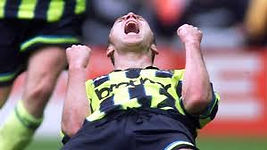
Bert Trautman
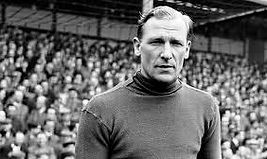
Shaun Wright Phillips

Kevin Horlock

Georgi Kinkladze

David Seaman
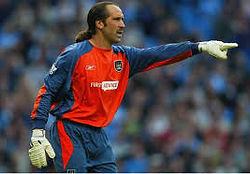
Nicky Weaver

mike summerbee

Nigel De Jong

Micah Richards

Ali Bernarbia

Uwe Rosler

Richard Dunne

Tony Book
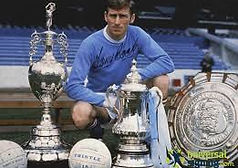
Neil Young
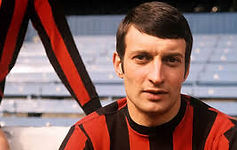
Mario Ballotelli

Joleon Lescott

Colin Bell
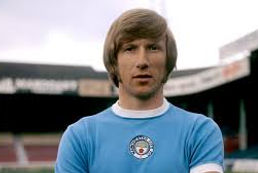
paulo wanchope

Trevor Sinclair

Manchester City History
City gained their first honours by winning the Second Division in 1899; with it came promotion to the highest level in English football, the First Division. They went on to claim their first major honour on 23 April 1904, beating Bolton Wanderers 1–0 at Crystal Palace to win the FA Cup; City narrowly missed out on a League and Cup double that season after finishing runners-up in the League but City became the first club in Manchester to win a major honour.[1] In the seasons following the FA Cup triumph, the club was dogged by allegations of financial irregularities, culminating in the suspension of seventeen players in 1906, including captain Billy Meredith, who subsequently moved across town to Manchester United.[2] A fire at Hyde Road destroyed the main stand in 1920, and in 1923 the club moved to their new purpose-built stadium at Maine Road in Moss Side.[3]
After relegation to the Second Division in 1963, the future looked bleak with a record low home attendance of 8,015 against Swindon Town in January 1965.[8] In the summer of 1965, the management team of Joe Mercer and Malcolm Allison was appointed. In the first season under Mercer, City won the Second Division title and made important signings in Mike Summerbee and Colin Bell.[9] Two seasons later, in 1967–68, Manchester City claimed the League Championship for the second time, clinching the title on the final day of the season with a 4–3 win at Newcastle United and beating their close neighbours Manchester United into second place.[10] Further trophies followed: City won the FA Cup in 1969, before achieving European success by winning the European Cup Winners' Cup in 1970, beating Górnik Zabrze 2–1 in Vienna.[11] City also won the League Cup that season, becoming the second English team to win a European trophy and a domestic trophy in the same season.
By 2008, the club was in a financially precarious position. Thaksin Shinawatra had taken control of the club a year before, but his political travails saw his assets frozen.[23] Then, in August 2008, the club was purchased by the Abu Dhabi United Group. The takeover was immediately followed by a flurry of bids for high-profile players; the club broke the British transfer record by signing Brazilian international Robinho from Real Madrid for £32.5 million.[24] Performances were not a huge improvement on the previous season despite the influx of money however, with the team finishing tenth, although they did well to reach the quarter-finals of the UEFA Cup. During the summer of 2009, the club took transfer spending to an unprecedented level, with an outlay of over £100 million on players Gareth Barry, Roque Santa Cruz, Kolo Touré, Emmanuel Adebayor, Carlos Tevez and Joleon Lescott.[25] In December 2009, Mark Hughes - who had been hired shortly before the change in ownership but was originally retained by the new board - was replaced as manager by Roberto Mancini.[26] City finished the season in fifth position in the Premier League, narrowly missing out on a place in the Champions League, and competed in the UEFA Europa League in season 2010–11.
Continued investment in players followed in successive seasons, and results began to match the upturn in player quality. City reached the 2011 FA Cup Final, their first major final in over thirty years, after defeating derby rivals Manchester United in the semi-final,[27] the first time they had knocked their rival out of a cup competition since 1975. They defeated Stoke City 1–0 in the final, securing their fifth FA Cup, the club's first major trophy since winning the 1976 League Cup. In the same week, the club qualified for the UEFA Champions League for the first time since 1968 with a 1–0 Premier League win over Tottenham Hotspur.[28] On the last day of the 2010–11 season, City passed Arsenal for third place in the Premier League, thereby securing qualification directly into the Champions League group stage. Strong performances continued to follow in the 2011–12 season,
with the club beginning the following season in commanding form, including beating Tottenham 5–1 at White Hart Lane and humbling Manchester United by a 6–1 scoreline in United's own stadium. Although the strong form waned half-way through the season, and City at one point fell eight points behind their bitter rivals with only six games left to play, an unprecedented slump by the previous champions allowed the blue side of Manchester to draw back level with two games to go, setting up a thrilling finale to the season with both teams going into the last day equal on points. Despite City only needing a home win against a team in the relegation zone, they still managed to fall a goal behind by the end of normal time, leading some of United's players to finish their game celebrating in the belief that they had won the league. Two goals in injury time - including one scored almost five minutes after normal time had elapsed - resulted in an almost-literal last-minute title victory, City's first in 44 years, and became only the fifth team to win the Premier League since its creation in 1992. In the aftermath that followed, the event was described by media sources from the UK and around the world as the greatest moment in Premier League history.[29][30] The game was only made all the more notable for former player Joey Barton's sending off, where he committed three separate red card-able incidents on three different players in the space of only a few seconds, resulting in a 12-game ban which effectively forced him to leave English football
After an end to the season which many believed would only spur City on, however, the following season failed to capitalise on any of the gains made in the first two full seasons of Mancini's reign. The transfer window saw virtually no players join the club until the last day of the season, when a last-minute burst of activity saw four different players all join in the space of around 10 hours. The free-flowing football of the previous season was suddenly rare to behold, and while City rarely seemed likely to drop below second in the table, they posed little title challenge all season. In the UEFA Champions League, the club was eliminated at the group stage for a second successive season, in a result which seemed to confirm Mancini's reputation as far better at managing in domestic games than European, while a second FA Cup final in three seasons ended in a 1–0 defeat to relegatedWigan Athletic.[32] The loss resulted in Mancini's dismissal, ostensibly as he had failed to reach his targets for the season[33] but with many in the press suggesting a break-down of relations between Mancini and his players[34] but also between the Italian and his board-level superiors,[35] while a refusal to promote young players was also cited.[36] In his place was appointed the Chilean Manuel Pellegrini,[37] who boasted a far more impressive Champions League record but less of a reputation for trophy-winning.